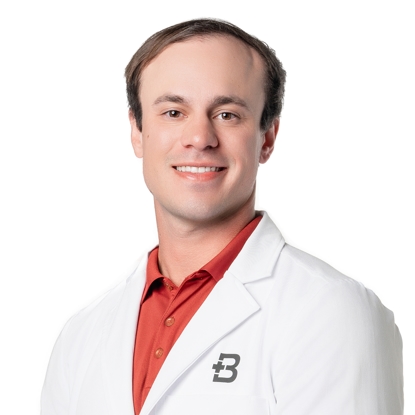Hoop Dreams

Meet Dr. Win Moore and his sharpshooting daughter, Laykin.
Laykin Moore is a rising star in Arkansas high school basketball. The sophomore do-everything guard can run the point, drive from the wing or shoot the lights out from the perimeter as her team requires. Quick and tough, she sets an aggressive pace on defense too, setting an example for her Mountain Home Lady Bomber teammates to follow.
Dr. M.B. “Win” Moore III, an orthopaedic surgeon with Baxter Health, relays all of these facts with round notes of pride in his voice. Along with his wife Dana, he’s loved every single moment spent in the bleachers and shagging rebounds for the couple’s only child. And he marvels at how no moment has been too big, and no opponent too intimidating for Laykin to handle in her young career—save one.
“I’ll tell you a funny story,” he said, already giggling. “Our backyard has this long slope that goes into the woods. Laykin is out there shooting hoops, like always, and she comes running up and goes, ‘Dad, there’s something in the woods. There’s something bad in the woods.’ What are you talking about, Laykin?
“I go downstairs, I walk down to the basketball court. I go down the hill. I ease into the woods. It’s a dang bunny rabbit!”
The fearsome forest bunny rabbit is just one of the adventures the family has enjoyed since Laykin discovered basketball along about fifth grade.
“I didn’t have the devotion that my daughter has, ever,” Moore said. “When COVID-19 hit, they all had to do school at home, and she loved it because she could get all her schoolwork done in two hours, then she was in the back yard shooting. She’d shoot six hours a day, eight hours a day. She did it all herself; she took the very little bit of talent that I gave her, a lot of athletic talent her mother gave her and she made it her own.”
Though he’s dismissive of it, Moore was a pretty decent baller himself back in the day. At 6’5, he was the man in the middle for Columbia Academy in Columbia, Mississippi, a sleepy Gulf-side community now numbering just under 6,000 people.
“When I went through high school, I played center because I was tall,” he said. “In the old days, centers didn’t dribble the ball very much. We were basically there to rebound and to play in the paint.”
After his freshmen year at Mississippi State University in Starkville, Moore transferred to the University of Southern Mississippi in Hattiesburg and had a brush with playing at the next level. “I get off to college, and I get invited to walk on with the college as a practice player,” he said. “We were in the gym where students go and shoot and play pickup ball. Four or five of us got approached by coaches to say, ‘Hey, y’all need to come practice with us.’ They needed warm bodies, so we said sure, we’re warm bodies, we’ll play.
“Well, I found out really quick that being 6’5” as a center that I’m facing a center at 7’1”. Both of the starting guards are 6’ 5”. I thought, ‘Whoa! What am I doing here?’ I was a very good defensive player, so I got to practice, but I didn’t ever want to play ball in college. I realized very quickly I could not go to medical school and play college basketball. Even if I had a chance to play, it was way too much work. After about six weeks, I politely bowed out of that and went to work trying to make grades.”
What Moore might have missed on the hardwood he more than accounted for in the classroom. After earning his undergrad, he completed the University of Mississippi School of Medicine in Jackson and his general and orthopaedic surgery internship and residency at Louisiana State University Medical Center in Shreveport. In the process, he stretched his family’s legacy in medicine into its third generation.
“My grandfather, Merwin B. Moore, Sr., and my father, Merwin B. Moore, Jr., were both surgeons. I was raised around a lot of medical people,” he said. “They were in general surgery, but they practiced back in the days when general surgeons did everything.
“I initially wasn’t that interested in going to medical school until I had an unfortunate event happen. My younger brother was killed when I was a sophomore in college, and that reset my whole thought of what I wanted to do. I started in general surgery and then switched to orthopedics. The short and long of it is I started working with some orthopaedic residents my second year of general surgery and liked them and liked what they did and just switched.”
Moore practiced in Kansas and Missouri before landing with Baxter Health in 2008. For all the good things that move has brought him since, if he’s honest, it was the area’s legendary fishing that lured him here initially.
“I started coming up here during my residency days to fish, so I knew about North Arkansas,” he said. “I still love to fish, I just don’t get the time I want, but I have made a promise to myself to change that very quickly. I probably fish 10 times a year; I should be fishing 100 times a year living right here in the trout capital of the world.”
Moore said while the types of cases he sees haven’t changed all that much—he’s a hip surgery and joint replacement guy, having stepped back from spine work 20 years ago—the demographic of his patients has changed somewhat.
“The older population, 55 and older, don’t come in until their arm is falling off,” he said. “The younger generation is much more into getting things looked at and taken care of earlier. I think that’s changed with the availability of all the subspecialists; people 65 and older didn’t have access to doctors like they do now.”
What’s changed more dramatically are the tools of his trade and for that he is quick to credit Baxter Health leadership, which has invested in equipment and expertise to match health systems several times its size.
“Many years ago, there was a commitment from the board, the business community and the general population to make sure there was a good medical center here,” he said. “For the most part, the administrators of this hospital have been able to see the future, have a vision and make it happen. That’s very unusual in a smaller community. You also have a board that’s made up of a lot of great people in this community who truly love it and want it to thrive. Part of thriving is to have the right medical facility.
“On the orthopaedic side specifically, the board has been really good about buying and supplying all specialists with things they need. The hospital bought us not one but two Hana tables that the five doctors here use to do hip procedures. We can have multiple doctors doing multiple hip surgeries because we have the equipment to do it. I have a good friend who’s over the orthopaedic department at Methodist Hospital in Houston, and they’ve got seven doctors but only one high-up table.”
Moore said he’s never been happier in his life and career than he is now. Though at age 65 the topic of retirement comes up more than it used to, he waves the subject away from the foreseeable future.
“Retirement, to me, is purely a health issue, both mental and physical,” he said. “The way we run the clinic has been extremely helpful in taking a great deal of the load that I don’t like off of me, which has allowed me to practice medicine and really have a life that in the last 15 years I’ve never had before.
“My father practiced ’til he was 70 and he could have practiced years longer. I’m thinking in my early 70s, I certainly will slow down a lot and turn more over to the younger guys, but I don’t know that I’ll ever quit as long as I’m physically and mentally healthy enough to do it. I love it too much.”
Photography by James Moore

.png)

